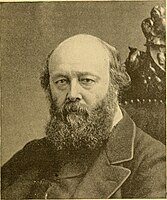
Joseph Chamberlain was a British statesman who was first a radical Liberal, then a Liberal Unionist after opposing home rule for Ireland, and eventually served as a leading imperialist in coalition with the Conservatives. He split both major British parties in the course of his career. He was the father, by different marriages, of Nobel Peace Prize winner Austen Chamberlain and of Prime Minister Neville Chamberlain.
The Liberal Unionist Party was a British political party that was formed in 1886 by a faction that broke away from the Liberal Party. Led by Lord Hartington and Joseph Chamberlain, the party established a political alliance with the Conservative Party in opposition to Irish Home Rule. The two parties formed the ten-year-long coalition Unionist Government 1895–1905 but kept separate political funds and their own party organisations until a complete merger between the Liberal Unionist and the Conservative parties was agreed to in May 1912.

Arthur James Balfour, 1st Earl of Balfour,, also known as Lord Balfour, was a British statesman and Conservative politician who served as Prime Minister of the United Kingdom from 1902 to 1905. As foreign secretary in the Lloyd George ministry, he issued the Balfour Declaration of 1917 on behalf of the cabinet, which supported a "home for the Jewish people" in Palestine.

Archibald Philip Primrose, 5th Earl of Rosebery, 1st Earl of Midlothian, was a British Liberal Party politician who served as Prime Minister of the United Kingdom from March 1894 to June 1895. Between the death of his father, in 1851, and the death of his grandfather, the 4th Earl of Rosebery, in 1868, he was known by the courtesy title of Lord Dalmeny.

Spencer Compton Cavendish, 8th Duke of Devonshire,, styled Lord Cavendish of Keighley between 1834 and 1858 and Marquess of Hartington between 1858 and 1891, was a British statesman. He has the distinction of having held leading positions in three political parties: leading the Liberal Party, the Liberal Unionist Party and the Conservative Party in either the House of Commons or the House of Lords. After 1886 he increasingly voted with the Conservatives. He declined to become prime minister on three occasions, because the circumstances were never right. Historian and politician Roy Jenkins said he was "too easy-going and too little of a party man." He held some passions, but he rarely displayed them regarding the most controversial issues of the day.

William Waldegrave Palmer, 2nd Earl of Selborne, styled Viscount Wolmer between 1882 and 1895, was a British politician and colonial administrator, who served as High Commissioner for Southern Africa.
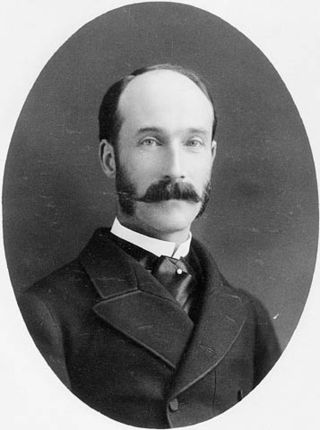
Henry Charles Keith Petty-Fitzmaurice, 5th Marquess of Lansdowne,, was a British statesman who served successively as Governor General of Canada, Viceroy of India, Secretary of State for War and Secretary of State for Foreign Affairs.
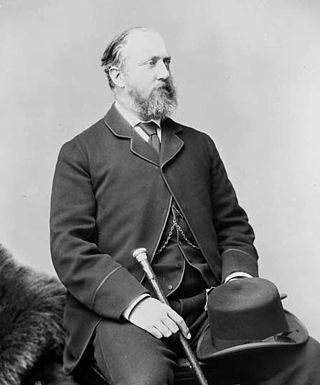
Frederick Arthur Stanley, 16th Earl of Derby, styled as Hon. Frederick Stanley from 1844 to 1886 and as The Lord Stanley of Preston between 1886 and 1893, was a Conservative Party politician in the United Kingdom who served as Colonial Secretary from 1885 to 1886 and Governor General of Canada from 1888 to 1893. An avid sportsman, he built Stanley House Stables in England and is famous in North America for presenting Canada with the Stanley Cup, the championship trophy in ice hockey. Stanley was also one of the original inductees of the Hockey Hall of Fame.

Michael Edward Hicks Beach, 1st Earl St Aldwyn,, known as Sir Michael Hicks Beach, Bt, from 1854 to 1906 and subsequently as The Viscount St Aldwyn to 1915, was a British Conservative politician. Known as "Black Michael", he notably served as Chancellor of the Exchequer from 1885 to 1886 and again from 1895 to 1902 and also led the Conservative Party in the House of Commons from 1885 to 1886. Due to the length of his service, he was Father of the House from 1901 to 1906, when he took his peerage.

William Hillier Onslow, 4th Earl of Onslow,, was a British Conservative politician. He held several governmental positions between 1880 and 1905 and was also Governor of New Zealand between 1889 and 1892.

The Souls was a small loosely-knit but distinctive elite social and intellectual group in the United Kingdom from 1885 to the turn of the century. Many of the most distinguished British politicians and intellectuals of the time were members. The original group of Souls reached its zenith in the early 1890s and had faded out as a coherent clique by 1900.

The National Government of 1937–1939 was formed by Neville Chamberlain on his appointment as Prime Minister of the United Kingdom by King George VI. He succeeded Stanley Baldwin, who announced his resignation following the coronation of the King and Queen in May 1937.
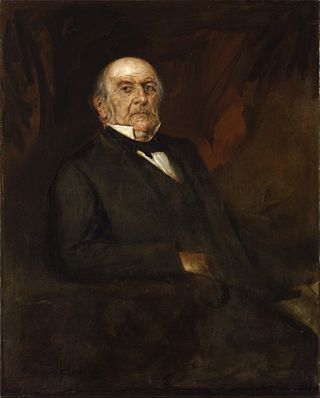
The third Gladstone ministry was one of the shortest-lived ministries in British history. It was led by William Ewart Gladstone of the Liberal Party upon his reappointment as Prime Minister of the United Kingdom by Queen Victoria. It lasted five months until July 1886.

A coalition of the Conservative and Liberal Unionist parties took power in the United Kingdom shortly before the 1895 general election. Conservative leader Lord Salisbury was appointed Prime Minister and his nephew, Arthur Balfour, became Leader of the House of Commons, but various major posts went to the Liberal Unionists, most notably the Leader of the House of Lords, the Liberal Unionist Duke of Devonshire, who was made Lord President, and his colleague in the Commons, Joseph Chamberlain, who became Colonial Secretary. It was this government which would conduct the Second Boer War from 1899–1902, which helped them to win a landslide victory at the 1900 general election.

Walter Hume Long, 1st Viscount Long,, was a British Unionist politician. In a political career spanning over 40 years, he held office as President of the Board of Agriculture, President of the Local Government Board, Chief Secretary for Ireland, Secretary of State for the Colonies and First Lord of the Admiralty. He is also remembered for his links with Irish Unionism, and served as Leader of the Irish Unionist Party in the House of Commons from 1906 to 1910.
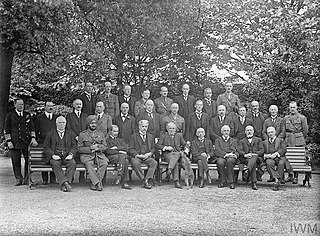
Liberal David Lloyd George formed a coalition government in the United Kingdom in December 1916, and was appointed Prime Minister of the United Kingdom by King George V. It replaced the earlier wartime coalition under H. H. Asquith, which had been held responsible for losses during the Great War. Those Liberals who continued to support Asquith served as the Official Opposition. The government continued in power after the end of the war in 1918, though Lloyd George was increasingly reliant on the Conservatives for support. After several scandals including allegations of the sale of honours, the Conservatives withdrew their support after a meeting at the Carlton Club in 1922, and Bonar Law formed a government.

The Liberal government of the United Kingdom of Great Britain and Ireland that began in 1905 and ended in 1915 consisted of two ministries: the first led by Henry Campbell-Bannerman and the final three by H. H. Asquith.

The National Government of 1931–1935 was formed by Ramsay MacDonald following his reappointment as Prime Minister of the United Kingdom by King George V after the general election in October 1931.

Charles Stewart Vane-Tempest-Stewart, 6th Marquess of Londonderry,, styled Viscount Castlereagh between 1872 and 1884, was a British Conservative politician, landowner and benefactor, who served in various capacities in the Conservative administrations of the late 19th and early 20th centuries. After succeeding his father in the marquessate in 1884, he was Lord-Lieutenant of Ireland between 1886 and 1889. He later held office as Postmaster General between 1900 and 1902 and as President of the Board of Education between 1902 and 1905. A supporter of the Protestant causes in Ulster, he was an opponent of Irish Home Rule and one of the instigators of the formal alliance between the Conservative Party and the Liberal Unionists in 1893.
